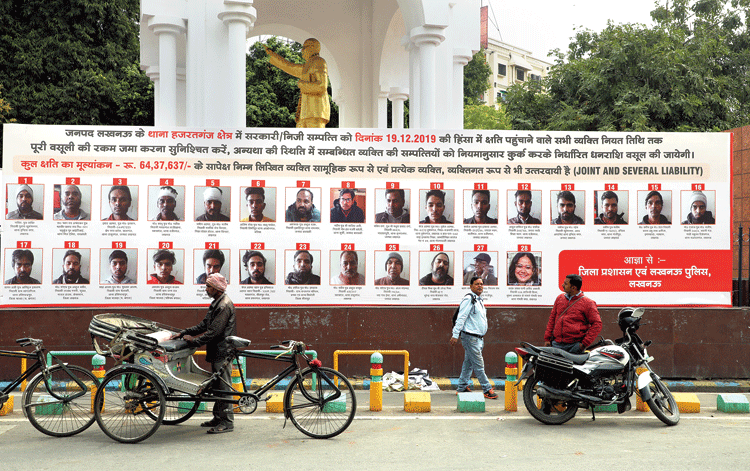Allahabad High Court has asked the Yogi Adityanath government to immediately remove roadside banners containing photographs and addresses of citizens it has branded “rioters”, noting that the right to privacy is protected as an intrinsic part of life and personal liberty under the Constitution and even the slightest injury to it is not permissible.
The special bench of Chief Justice Govind Mathur and Justice Ramesh Sinha, which took up the matter as a public interest writ on its own, said: “As a matter of fact, the placement of personal data of selected persons reflects colourable exercise of powers by the executive.”
The banners, installed on March 6 at important crossroads in Lucknow, had pictures and addresses of 53 people and directed them to pay up for damage to property during the protests against the Citizenship Amendment Act on December 19.
“The government will recover Rs 1.55 crore from these rioters of Lucknow by auctioning their properties if they don’t pay the fine on their own,” the banners warned.
No charges have been proved against the 53 people, who were arrested and granted bail. Later, several of them approached the high court, which stayed their re-arrest and the recovery of any damages from them.
On Monday, the high court said: “Privacy is a fundamental human right recognised in the United Nations Declaration of Human Rights, the international convention on civil and political rights and many other international and regional treaties. Privacy underpins human dignity and key values of a democracy.
“Nearly every country in the world recognises a right of privacy explicitly in their Constitution. In our country, where privacy is not explicitly recognised as a fundamental right in the Constitution, the courts have found such right protected as an intrinsic part of life and personal liberty under Article 21 of the Constitution of India.”
It continued: “This fundamental right provides lungs to the edifice of our entire constitutional system. A slightest injury to it is impermissible as that may be fatal for our values designed and depicted in the Preamble (to) the Constitution.”
The court said the simple question was the legitimacy of the display of photographs, names and addresses of some people by the Lucknow district and police administration through banners.
“Noticing injury to the right of privacy, the Chief Justice of this court directed the registry to register a petition for writ in public interest,” the court said.
Advocate-general Raghvendra Singh accepted that there was no statute permitting the authorities to put up such banners. But he argued that the aim was to deter “mischief-mongers” from damaging property and said the court must not interfere.
The court said in its order: “We do not find any necessity for a democratic society for a legitimate aim to have publication of personal data and identity.”
The advocate-general had also “failed to satisfy us as to why the personal data of few persons have been placed on banners though in the state of Uttar Pradesh there are lakhs of accused persons who are facing serious allegations pertaining to commission of crimes, whose personal details have not been subjected to publicity”, it added.
The state’s action “is nothing but an unwarranted interference in privacy of people”, the court said, adding: “The same, hence, is in violation of Article 21 of the Constitution of India.”
It directed the removal of the banners and said a compliance report must be submitted by March 16. “The state of Uttar Pradesh is directed not to place such banners on roadside containing personal data of individuals without having authority of law,” the order said.











